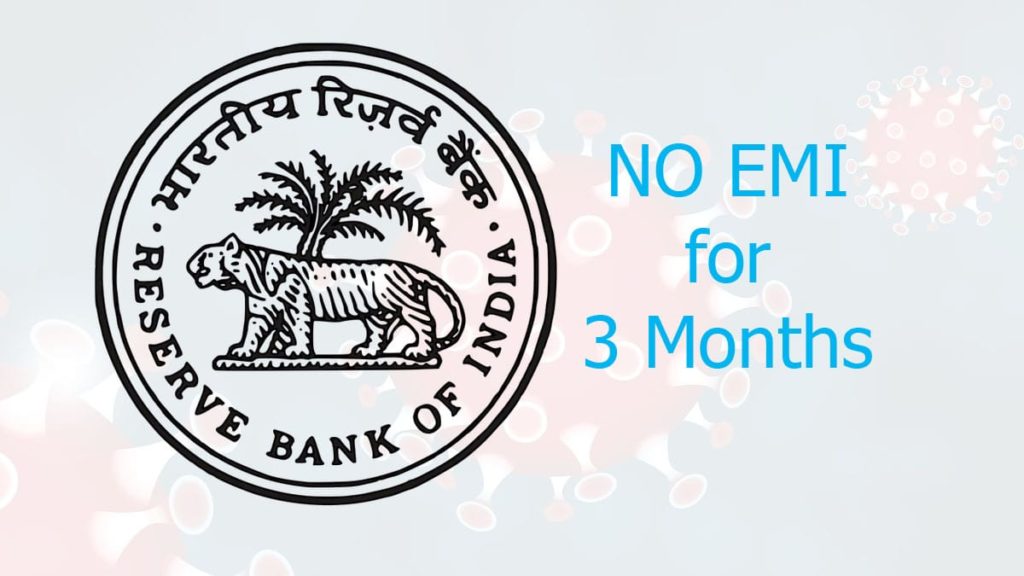RBI allows three months pause on loan EMIs in the wake of Covid 19 emergency
Today, on 27th March, 2020 RBI Chief Shaktikanta Das announced three months EMI relief in the wake of Covid 19 emergency.
Mr. Das was quoted as saying “All commercial banks (including regional rural banks, small finance banks and local area banks), co-operative banks, all -India Financial Institutions, and NBFCs (including housing finance companies and micro-finance institutions) (“lending institutions”) are being permitted to allow a moratorium of three months on payment of installments in respect of all term loans outstanding as on March 1, 2020. Accordingly, the repayment schedule and all subsequent due dates, as also the tenor for such loans, maybe shifted across the board by three months.”

Table of Contents
What does it mean?
The three-month moratorium on EMI would gives the borrowers relief from their monthly term loan repayments without causing any effect on their EMI scores. Furthermore, the moratorium would have no effect on the prevailing terms and conditions of the loan. However, if the lending institution has certain terms and conditions on charges associated with the moratorium then these terms and conditions would be applicable as per the institution’s internal lending policy. RBI also deferred the repayments on credit card purchases under the latest moratorium policy.
In general instance, the deferment of loan repayments results in a bad credit score and the borrower’s credit history is categorized under risk. Nevertheless, in the present scenario, the borrower’s credit score remains unaffected with regards to the RBI’s announcement.
The RBI’s Circular
Post announcement of loan deferment, the RBI issued a circular to clarify on specific matters.
- In the course of the moratorium, the interest would continue to accumulate on the unpaid share of the term loans.
- Postponed installments under the moratorium would comprise the subsequent disbursements falling in between March 1, 2020 and May 31, 2020: (a) principal and/or interest components; (b) bullet repayments; (c) equated monthly installments; (d) credit card dues.
- All the financial bodies, NBFCs, and banks are allowed to serve a moratorium of three-months on term loans outstanding repayments.
Would moratorium guarantee a total relief from payment?
The real moratorium condition could be different in different fiscal institutions as per their internal policies. Right now it is unclear if a borrower is exempted from the EMI for the three-month period, or whether he will have to pay this loan amount at a later date. Generally, in the course of a moratorium, simple interest is paid on the outstanding loan.
According to financial experts, the present moratorium means that for the stated three months, the borrowers would not have to make EMI repayments on their borrowed amount. The EMIs would resume once the moratorium period is over.
Views from Financial Experts
SBI chairman Rajnish Kumar clarified that “With regards to the moratorium period, across the board, all term loan EMIs (including those taken for loans against property) will get shifted by three months automatically.”
According to Gaurav Gupta, CEO & Founder, MyLoancare.in “In a significant relief to borrowers, RBI has allowed banks to give a three months moratorium for all term loan repayments without negatively impacting the asset book of the banks and credit score of the borrowers. As a result of the moratorium, tenure of such loans will get extended by 3 months which should be possible as floating-rate loan contracts typically have a provision for extension of the loan tenure. Customers will also pay additional EMI is something that needs to be clarified by banks”.
The Central bank governor backed Mr. Gupta by adding “The moratorium/deferment is being provided specifically to enable the borrowers to tide over the economic fallout from COVID-19. Hence, the same will not be treated as a change in terms and conditions of loan agreements due to the financial difficulty of the borrowers and, consequently, will not result in asset classification downgrade. The lending institutions may accordingly put in place a Board approved policy in this regard.”
The RBI later stated that “The rescheduling of payments will not qualify as a default for the purposes of supervisory reporting and reporting to credit information companies (CICs) by the lending institutions. CICs shall ensure that the actions taken by lending institutions pursuant to the above announcements do not adversely impact the credit history of the beneficiaries.”
Should you go for Moratorium?
Experts state a clear “no”. According to Adhil Shetty, CEO, BankBazaar.com “If you can afford to repay your loan EMIs, you should try to set aside that amount even if you’re not required to pay them during the moratorium unless doing so will adversely impact other pressing financial requirements. This would ensure speedy lowering of loan burden once the moratorium ends.” He further added that borrowers should approach their respective banks and get complete clarity on their internal moratorium policies and take decisions accordingly.
Purpose of Moratorium
The moratorium would give instant relief to numerous people, particularly to the individuals who are self-employed so that they would find relief from loan repayments during the lockdown period. This would help them in better planning their financial resources while at the same time remain unaffected by any negative impact to their credit score.
Definition of Moratorium
The moratorium period is defined as the duration of time in which an individual is exempted from EMI payments on the loan taken. Some experts also define this duration as EMI holiday. In general, this type of break is given to assist borrowers to come out of temporary fiscal difficulties and plan their finances in a better manner.
I’m Shiv Kumar, a graduate with a passion for finance, marketing, and technology. My journey into finance started with a desire to understand money management and investing.
Our main goal is to empower individuals through financial education. We believe that everyone should have the opportunity to build a strong financial foundation. Whether you’re a seasoned investor or just getting started, we provide articles, guides, and resources to help you navigate the financial landscape.
I invite you to join our community of financially savvy individuals. Feel free to ask questions, engage with our content, and explore the topics that matter to you. Together, let’s take control of our financial futures.




